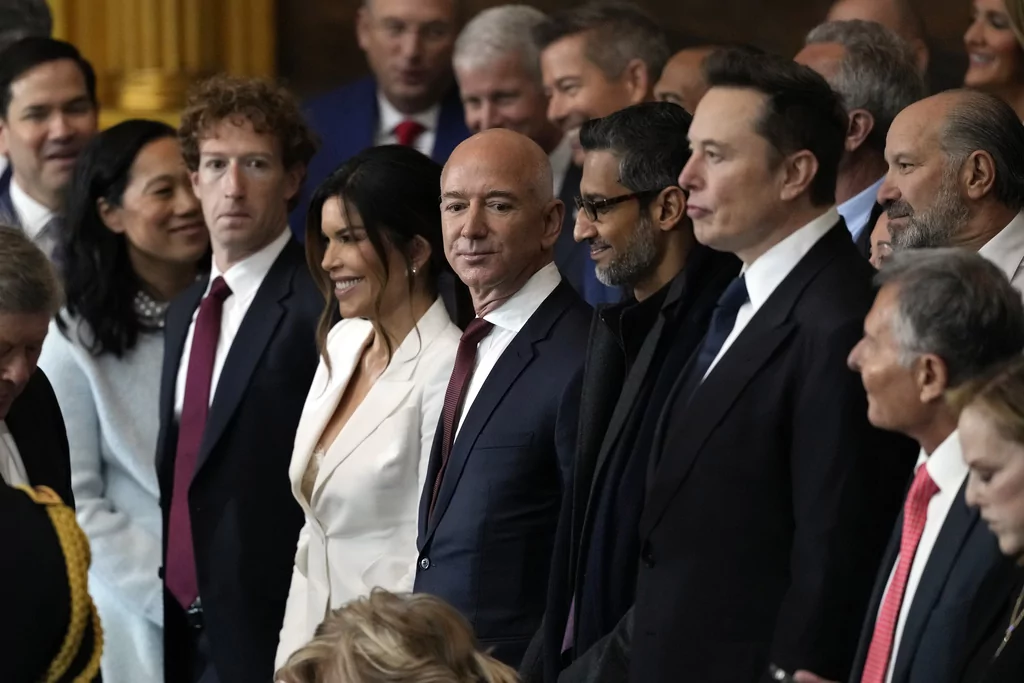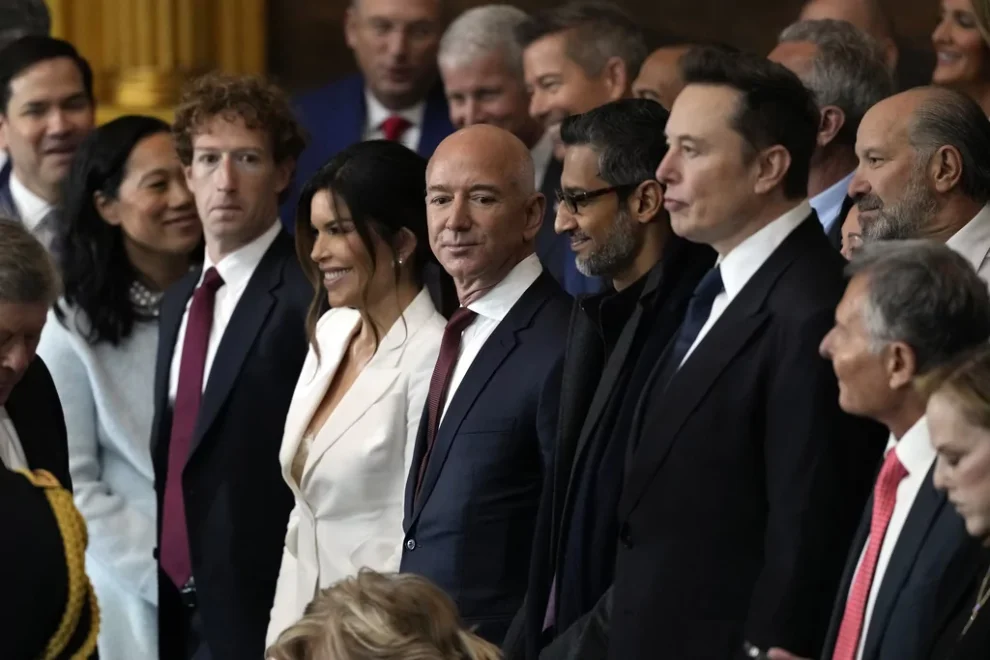Antitrust lawyers for the Trump administration are set to face off this month with Meta’s and Google’s lawyers in courtrooms in Washington, D.C., where they appear poised to continue seamlessly the Biden administration’s fights against the tech giants.
The two trials offer opportunities to chip away at Big Tech’s power, a rare shared goal of the Biden and Trump administrations. Those and other legal fights, including ones against Amazon and Apple, showcase common ground between Republicans and Democrats. Other antitrust activity in the tech sector could, however, spotlight divides.
Gail Slater, Trump’s new antitrust enforcer at the Department of Justice, has emphasized the broad coalition angling to crack down on Big Tech, which likely contributed to the vast bipartisan support she gained during her Senate confirmation vote in March.
At a recent panel hosted by Y Combinator, Slater acknowledged the through-line from the last administration, saying the aversion to “monopolies and oligopolies” spans the political spectrum.
But some experts put an asterisk on that point, saying the Left might be interested in breaking up Big Tech but that some of the interest derives from a disdain for big, wealthy companies rather than a concern for their consumers.
Lawsuits brought by Trump 1.0 and Biden
Less than three months into the first administration, legal activity signals similarities between former President Joe Biden to President Donald Trump on antitrust enforcement.
A lawsuit brought by the Federal Trade Commission against Meta in 2020 at the end of the first Trump administration has inched through the district court system in Washington, D.C. The presiding judge in the case is James Boasberg, who is now in Trump’s crosshairs over the judge’s recent ruling on a separate case related to deportations.
Boasberg initially tossed out the lawsuit but gave the FTC a chance to amend its complaint.
In a revised complaint in 2021, the FTC, under former Chairwoman Lina Khan, alleged that Meta, then known as Facebook, engaged in an “anticompetitive acquisition strategy” by scooping up Instagram and WhatsApp to prevent the budding companies from competing with Facebook in the social media space.
The FTC alleged Meta went on to control Instagram and WhatsApp successfully, which “gives the game away entirely,” Meta’s attorneys argued in court filings. The attorneys said the acquisitions were “procompetitive success stories.”
“In essence, the FTC seeks to punish Facebook for delivering ever-greater value to consumers,” the attorneys said.
Boasberg was unconvinced, and now, years later, the case is headed to trial on April 14, unless Meta CEO Mark Zuckerberg can score an eleventh-hour settlement with Trump.
The DOJ’s case against Google at the end of Trump’s first term, also brought in Washington, D.C., led to a landmark ruling last summer with Judge Amit Mehta finding that Google violated the Sherman Act, a key antitrust law, by monopolizing online searches. Google improperly paid Apple massive sums to make Google the default search engine on its products, the judge found.
A trial beginning April 21 is set to determine remedies to Google’s violations.
Perhaps the clearest sign yet of continuity between administrations came when the Trump DOJ reiterated in a court filing last month that it planned to seek the same tough remedies as the Biden administration. They included the controversial demand that Google divest its Chrome browser, though the Trump administration excised a provision that would force Google to sell off AI companies. Google said in a public statement that it disagrees with the proposals and plans to appeal the judge’s decision.
Other antitrust cases in their early stages, including another one against Google related to its advertising prowess, one against Apple that references its lack of compatibility with non-Apple devices, and one against Amazon related to its online retail dominance, were all also brought during the Biden administration and are now left in the hands of the Trump administration to see through to trials.
Conspicuous Trump shifts
Tech CEOs have flocked to Trump, donating hefty sums to his inauguration and paying him compliments and visits in the aftermath of his election win, a phenomenon not seen during the Biden administration.
Critics have said the billionaire industry leaders are cozying up to Trump, a famed deal-maker, in hopes of seeking leniency from his DOJ and FTC enforcers. Zuckerberg, whose company is a defendant in an imminent antitrust trial, raised eyebrows by visiting the White House for the explicit purpose, according to the Wall Street Journal, of seeking a settlement with Trump.

Emily Peterson-Cassin, a corporate power director for Demand Progress, viewed the sudden presence of the CEOs as “egregious subservience,” and said Zuckerberg’s infamous direct-to-camera turnabout this year, in which he announced he was doing away with fact-checking on his platform, could have been part of his “charm offensive,” given Trump has repeatedly alleged that Big Tech companies have for years elevated negative content about him while suppressing negative content about his opponents. Zuckerberg admitted to censoring controversial content about COVID-19 and Hunter Biden but has recently vowed to curb that practice.
“It’s just known that Trump is a guy who loves to be flattered,” Peterson-Cassin told the Washington Examiner.
Others say Trump has shown an openness to collaborating with tech companies, which a lawyer who previously worked at the FTC said is drawing CEOs to him in good faith.
“The Biden administration did not care about American companies. They did not care about innovation,” the lawyer told the Washington Examiner. “They just wanted to crush rich people, big things.”
He said that Trump, by contrast, understands that the tech titans drive innovation, the stock market, and jobs and that the president wants to leverage that.
Trump also distinguished himself from his predecessor by firing the two Democrats on the five-member FTC. While the pair are challenging their firings, which they argue are at odds with Supreme Court precedent, the move by Trump marked a step toward eliminating the traditional independence of the commission and bringing it more closely under the watch of the White House.
‘MAGA’ antitrust
While Trump’s deal-cutting could present curveballs, his top antitrust officials are projecting a take that appears rooted firmly in Trump’s MAGA brand: Government is too big, but it remains a convenient tool for penetrating the consolidated power of Big Tech companies, which can be equally as suppressive to everyday citizens as big government.
“We can call it MAGA antitrust. We can call it America First antitrust. I also am quite partial to hillbilly antitrust,” quipped Slater, a former JD Vance adviser, at the panel this month. “It’s about putting American citizens as consumers, as workers — we can define it how we want — giving them a seat at the table.”
In the 1970s, Robert Bork, a former solicitor general, sought to rein in antitrust enforcers by directing their attention away from big companies and onto consumers of those companies’ products and services. Bork looked at whether the consumers were seeing, for example, high costs or fewer product options. For decades, this focus on what became known as “consumer welfare” prevailed.
New companies would enter the scene and naturally correct monopolies if they were hurting consumers, Bork believed. Khan, who served during the Biden administration, argued Bork’s view needed a recalibration in the digital age because Big Tech companies were becoming too big, too fast, before their harm to consumers could be realized.
The lawyer and former FTC aide said, however, that Khan’s fresh take on antitrust came at the expense of the consumer.
“What the Biden administration did was ultra progressive, attacking companies in their rhetoric and in their process, just because they were big,” the former aide said.
Khan’s successor, Andrew Ferguson, wants “what’s best for consumers and American companies,” he said.
Ferguson has already shown a shift by bringing free speech into the fold. He, like Trump and many Republicans, highlight the tech giants’ propensity around 2020 to censor content about COVID-19 and elections as a new opportunity for antitrust enforcement that is uniquely consumer-focused.
Allum Bokhari, Foundation for Freedom Online managing director, told the Washington Examiner that combatting censorship must be central to antitrust enforcement during Trump’s second administration.
“Competition authorities are going to have an interest in ensuring competition, obviously. That’s their job,” Bokhari said. “I don’t think you can really separate that from the speech issue, because it’s such a fundamental part of these companies and what services they provide.”
Peterson-Cassin said that controlling the way Big Tech companies manage their platforms seemed at odds with supporting a free market. It takes on a “very strong undercurrent of top-down control of what the corporations are doing,” she said.
“The more effective solution would be to create an environment where a bunch of different companies can thrive and then people can choose what kind of experience they want,” she said.
Bokhari described that approach as a “build your own platform argument” that might not be realistic. He pointed to smaller, alternative companies, such as Parler, which was launched in 2018 and quickly overcome by right-wing and conspiratorial material, facing censorship challenges even by hosting providers.
Oddball coalitions
The latest indicator of bipartisan opportunities came when former Trump adviser and right-wing podcast host Steve Bannon spoke last week at the same panel as Slater, called the Little Tech Competition Summit, and heaped praise on Khan. Bannon called her “one of the most important political figures in this country.”
“It kind of stuns me of how antitrust the people we’ve put in [office are],” Bannon said. “People know I’m a big admirer of Lina Khan. I don’t think we’ve made that big a shift. I would love to have her back. I think she’d be terrific.”
In Congress, Sen. Josh Hawley (R-MO) has collaborated with Sen. Richard Blumenthal (D-CT) on legislation, while antitrust reform has brought together strange alliances in the House featuring the likes of Reps. Eric Swalwell (D-CA) and Tom McClintock (R-CA) in recent years.
FULL LIST OF EXECUTIVE ORDERS, ACTIONS, AND PROCLAMATIONS TRUMP HAS MADE AS PRESIDENT
Just before Trump took office, Blumenthal told the Washington Examiner he was optimistic about the Senate Judiciary Committee making advancements this Congress on a framework for regulating AI, a new and rapidly growing force in Big Tech, that he has introduced with Hawley.
“AI and antitrust are both very important potential topics for bipartisan cooperation,” the Connecticut Democrat said.
























